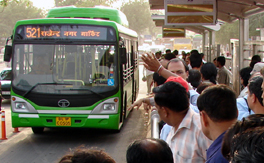Global database of Bus Rapid Transit systems

International Energy Agency in partnership with EMBARQ has launched this comprehensive global database of bus rapid transit (BRT) systems from over 130 cities and includes Delhi, Ahmedabad, Pune & Jaipur from India.
The International Energy Agency (IEA), in partnership with EMBARQ, a division of the World Resources Institute (WRI), has launched the Bus Rapid Transit (BRT) Database, a database of bus transport systems from over 130 cities worldwide. The BRT database is to provide a resource for policymakers, planners and researchers to source information on BRT systems. Additionally, it will include a publicly accessible web portal for anyone wishing to access information about BRT data. BRT systems are similar to metro systems in that they include dedicated lanes for buses in urban areas and often also include a pre-pay system, which allows higher volumes of traffic and more rapid boarding and alighting of buses. With efficient routing that translates into greater energy efficiency, these systems also lead to the reduction of carbon dioxide emissions, as people are drawn to choose mass transit over individualized options.
See Also
Videos: BRT systems around the world.
Standard: The BRT standard.
Guidelines: Bus rapid transit (BRT) accessibility guidelines.
Report: Urban transport initiatives in India.
Opinion: Before cars take over.
Feature: Mumbai BRTS: held up in transit.
Report: Lessons learned - major bus improvements in Latin America & Asia.







